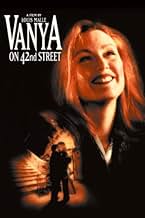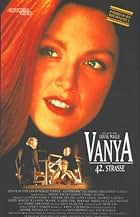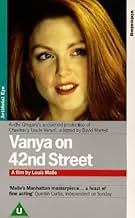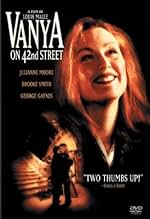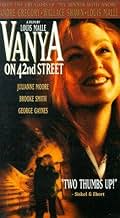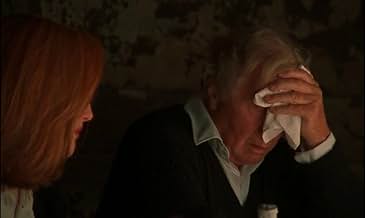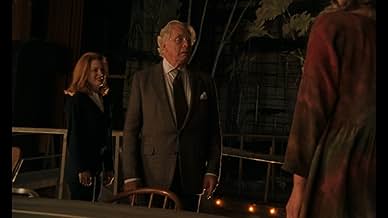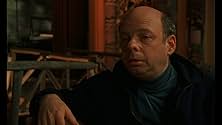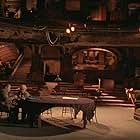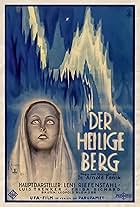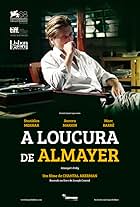IMDb RATING
7.3/10
5.5K
YOUR RATING
New York actors rehearse Chekhov's "Uncle Vanya" in a dilapidated theatre.New York actors rehearse Chekhov's "Uncle Vanya" in a dilapidated theatre.New York actors rehearse Chekhov's "Uncle Vanya" in a dilapidated theatre.
- Director
- Writers
- Stars
- Awards
- 3 wins & 13 nominations total
- Director
- Writers
- All cast & crew
- Production, box office & more at IMDbPro
Featured reviews
Malle's adaptation handles Tchekhov's notoriously difficult shifts in mood and context excellently, investing every scene and almost every word with an edge of ambivalence and frustration, and the performances are all first-rate. Moore in particular, from her first appearance in the film (which is without dialogue) to the final scene constructs a really intelligent performance as Yeliena, I feel, and she seems to cover the whole gamut of Yeliena's character from the giggly and superficial to the introspective.
With all due respect to the American school this film could have descended easily into overwrought Tennessee Williams-esque Naturalism with lots of method-style spitting and uncomfortable truth. Instead the intellectual, spiritual dimensions of Tchekhov's play are always brought to the fore, in addition of course to Tchekhov's dark brand of humour, where the actors (particularly Julianne Moore) laugh through their tears and visa versa. Avoiding the common temptation of drawing out the play's anguished characters at a snail's pace, Malle also paces the film well, with an emphasis on lightness and subtlety of delivery - the result is both intellectually and emotionally satisfying.
With all due respect to the American school this film could have descended easily into overwrought Tennessee Williams-esque Naturalism with lots of method-style spitting and uncomfortable truth. Instead the intellectual, spiritual dimensions of Tchekhov's play are always brought to the fore, in addition of course to Tchekhov's dark brand of humour, where the actors (particularly Julianne Moore) laugh through their tears and visa versa. Avoiding the common temptation of drawing out the play's anguished characters at a snail's pace, Malle also paces the film well, with an emphasis on lightness and subtlety of delivery - the result is both intellectually and emotionally satisfying.
Chekhov's Uncle Vanya stripped down to its bare essentials when a group of New York actors rehearse in a decaying theatre with no set dressings or props but just their talent, accompanied by David Mamet's modern adaptation of the play. Off course it may be stagy but you fall under the actors spell and that's what it's all about.
There's no shortage of intelligent work in film. But here we have one of the most complexly referential things I've ever seen. Simple self-reference points to itself. Common self-reference points to the viewer defining the experience.
But Mingus used to say why have three threads when you can have seven? Here, some of the most adventurous thinkers in film give us four threads, actually four and a half.
We have the Chekhov play and the Mamet wrapping. Make no mistake that this is not an editing or a translation, but an annotation. We have two perspectives simultaneously. Add to that the notion of the play not as a play for an audience as intended, but an event conducted regularly by the performers for their own sake. This is a creation orchestrated by Gregory, the third thread. One can clearly see in some scenes neither Chekhov nor Mamet but artists collaborating in dialogs. The inner eyes and the outer eyes differ.
Fourth, we have Malle's creation which introduces us into the equation with deliberately shaky and sometimes misframed camerawork. We aren't part of any prior experience, but the actors do include the camera in their collaboration, as an independent thread. Watch how Andre works the camera.
And finally, we have the framing of the artists in real life. This is not simultaneous with the others and in any case excludes the filmmaker.
I recall seeing Paul Newman in the Color of Money in the first scene, acting on three levels simultaneously. It took my breath away. Here, the purpose of the whole contrivance is to challenge the actors (and the viewers!) to participate in a jazz ensemble of acting where the layer of reality is constantly shifting. They chose Uncle Vanya as the base for a reason, because his evershifting foci of love and hate in pairs provide cues for levelshifting.
Shawn really plays on this. His skill wasn't apparent to me on first viewing, especially in the first scenes, where all players are on stage and the non-focus actors have to be invisible. But on repeated viewings one can see his mastery, his shifting forehead! Maybe he could have been a Dostoyevsky. The two young women should be celebrated to the heavens for what they do together. I never believed so many giggles and gasps and stutters and excited silences could be so finely woven, tossed so lightly.
This is really, really good stuff, very smart. So far as an intelligent construction you won't see a superior. I never expect to see four levels at once again in film at least centered in the acting.
But Mingus used to say why have three threads when you can have seven? Here, some of the most adventurous thinkers in film give us four threads, actually four and a half.
We have the Chekhov play and the Mamet wrapping. Make no mistake that this is not an editing or a translation, but an annotation. We have two perspectives simultaneously. Add to that the notion of the play not as a play for an audience as intended, but an event conducted regularly by the performers for their own sake. This is a creation orchestrated by Gregory, the third thread. One can clearly see in some scenes neither Chekhov nor Mamet but artists collaborating in dialogs. The inner eyes and the outer eyes differ.
Fourth, we have Malle's creation which introduces us into the equation with deliberately shaky and sometimes misframed camerawork. We aren't part of any prior experience, but the actors do include the camera in their collaboration, as an independent thread. Watch how Andre works the camera.
And finally, we have the framing of the artists in real life. This is not simultaneous with the others and in any case excludes the filmmaker.
I recall seeing Paul Newman in the Color of Money in the first scene, acting on three levels simultaneously. It took my breath away. Here, the purpose of the whole contrivance is to challenge the actors (and the viewers!) to participate in a jazz ensemble of acting where the layer of reality is constantly shifting. They chose Uncle Vanya as the base for a reason, because his evershifting foci of love and hate in pairs provide cues for levelshifting.
Shawn really plays on this. His skill wasn't apparent to me on first viewing, especially in the first scenes, where all players are on stage and the non-focus actors have to be invisible. But on repeated viewings one can see his mastery, his shifting forehead! Maybe he could have been a Dostoyevsky. The two young women should be celebrated to the heavens for what they do together. I never believed so many giggles and gasps and stutters and excited silences could be so finely woven, tossed so lightly.
This is really, really good stuff, very smart. So far as an intelligent construction you won't see a superior. I never expect to see four levels at once again in film at least centered in the acting.
In New York, the cast of Anton Chekhov's "Uncle Vanya" rehearse the play in a dilapidated theater on the 42nd Street.
The arrogant and selfish Professor Serybryakov (George Gaynes) is an elderly intellectual married with his gorgeous and younger second wife Yelena (Julianne Moore) that feels trapped in a prison with her marriage. They live in a farm that supports their lifestyle with the Professor Serybryakov's brother-in-law from the first marriage Vanya (Wallace Shawn), who manages the family business with Professor's daughter from his first marriage, Sonya (Brooke Smith), a plain single young woman and Vanya's mother. The local Dr. Astrov (Larry Pine) visits the family every day since he is in love with Yelena. She talks with him about his feelings for Sonya, but Astrov misunderstands and believes she is also in love with him. One day, Sonya confides to Yelena that she has an unrequited love for Dr. Astrov. When Professor Serybryakov discloses his intention of selling the real estate, there is a crisis in the family.
"Vanya on 42nd Street" is a filmed rehearsal of Anton Chekhov's play "Uncle Vanya" by Louis Malle. The talkative story about frustrated lives, where every character wish to have a different existence, is surprisingly engaging since there are no costumes or scenarios, but excellent direction and performances. The beginning is a little boring, I agree, but give a chance to this movie and you will certainly have a great (favorable) surprise. My vote is seven,
Title (Brazil): "Tio Vanya em Nova York" ("Uncle Vanya in New York")
The arrogant and selfish Professor Serybryakov (George Gaynes) is an elderly intellectual married with his gorgeous and younger second wife Yelena (Julianne Moore) that feels trapped in a prison with her marriage. They live in a farm that supports their lifestyle with the Professor Serybryakov's brother-in-law from the first marriage Vanya (Wallace Shawn), who manages the family business with Professor's daughter from his first marriage, Sonya (Brooke Smith), a plain single young woman and Vanya's mother. The local Dr. Astrov (Larry Pine) visits the family every day since he is in love with Yelena. She talks with him about his feelings for Sonya, but Astrov misunderstands and believes she is also in love with him. One day, Sonya confides to Yelena that she has an unrequited love for Dr. Astrov. When Professor Serybryakov discloses his intention of selling the real estate, there is a crisis in the family.
"Vanya on 42nd Street" is a filmed rehearsal of Anton Chekhov's play "Uncle Vanya" by Louis Malle. The talkative story about frustrated lives, where every character wish to have a different existence, is surprisingly engaging since there are no costumes or scenarios, but excellent direction and performances. The beginning is a little boring, I agree, but give a chance to this movie and you will certainly have a great (favorable) surprise. My vote is seven,
Title (Brazil): "Tio Vanya em Nova York" ("Uncle Vanya in New York")
I might not have ever seen this terrific film if it had not been for walking into the wrong theater. I was supposed to see screening of "A Night on Earth" during a local film festival, but I ended up in the middle of a screening of "Vanya on 42nd Street." I decided to stay and watch, not just because I had already seen "A Night on Earth" several times, but because I was curious when I saw Wallace Shawn & Andre Gregory on screen together in a film other then "My Dinner with Andre."
Don't be fooled and think that this film is simply a sequel to "My Dinner with Andre," because it is far from it. What you have here is a screen version of the stage play "Uncle Vanya" by Anton Chekhov, but with a twist. The cast is doing a rehearsal of "Uncle Vanya" in a rundown theater in the middle of NYC, to an audience of the director (Andre Gregory) and a few others. The film also includes breaks in the play for stage direction (acting as an intermission for the cast) as well as initial dialogue before and after the rehearsal. This also includes an amazing opening scene in which we see all the actors walking down 42nd Street in NYC heading toward the theater (literally appearing out of the crowdedness of NYC).
In addition to just seeing a fantastic version of "Uncle Vanya," you get some of the best acting performances in some time. Julianne Moore ("Boogie Nights") gets top billing being the best known cast member, but the film features some of the best performances by Wallace Shawn ("My Dinner with Andre"), Brooke Smith ("Series 7: The Contenders"), Larry Pine ("Dead Man Walking"), George Gaynes ("Police Academy" films), and stage actress Phoebe Brand. Even though I only mentioned a few, the entire cast is fantastic.
If you are in your local video store looking for something a bit unique, I highly recommend that you check out "Vanya on 42nd Street" for night of theater without leaving your house.
10/10
Don't be fooled and think that this film is simply a sequel to "My Dinner with Andre," because it is far from it. What you have here is a screen version of the stage play "Uncle Vanya" by Anton Chekhov, but with a twist. The cast is doing a rehearsal of "Uncle Vanya" in a rundown theater in the middle of NYC, to an audience of the director (Andre Gregory) and a few others. The film also includes breaks in the play for stage direction (acting as an intermission for the cast) as well as initial dialogue before and after the rehearsal. This also includes an amazing opening scene in which we see all the actors walking down 42nd Street in NYC heading toward the theater (literally appearing out of the crowdedness of NYC).
In addition to just seeing a fantastic version of "Uncle Vanya," you get some of the best acting performances in some time. Julianne Moore ("Boogie Nights") gets top billing being the best known cast member, but the film features some of the best performances by Wallace Shawn ("My Dinner with Andre"), Brooke Smith ("Series 7: The Contenders"), Larry Pine ("Dead Man Walking"), George Gaynes ("Police Academy" films), and stage actress Phoebe Brand. Even though I only mentioned a few, the entire cast is fantastic.
If you are in your local video store looking for something a bit unique, I highly recommend that you check out "Vanya on 42nd Street" for night of theater without leaving your house.
10/10
Storyline
Did you know
- TriviaFinal film directed by Louis Malle.
- GoofsIn the different acts, some people change clothes, while others don't. Sonya, for instance, wears two different dresses. In a run-through people don't change clothes.
- How long is Vanya on 42nd Street?Powered by Alexa
Details
- Release date
- Country of origin
- Languages
- Also known as
- Vanya on Forty-second Street
- Filming locations
- Production companies
- See more company credits at IMDbPro
Box office
- Gross US & Canada
- $1,746,050
- Opening weekend US & Canada
- $17,636
- Oct 23, 1994
- Gross worldwide
- $1,746,050
Contribute to this page
Suggest an edit or add missing content



